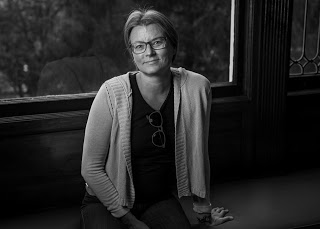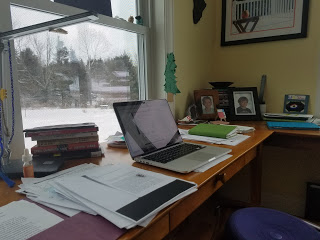I am Susan Thomson, and This is How I Work
 Today, I am interviewing Dr. Susan Thomson for the “How I Work” series. Susan Thomson (sthomson@colgate.edu) is Associate Professor of Peace and Conflict Studies. Her research is dedicated to understanding how systems of power structure the lives of individuals in so-called times of peace. She also studies the practical and ethical challenges of doing field-based research in post-conflict settings. Thomson is the author of Whispering Truth to Power: Everyday Resistance to Reconciliation in Post-Genocide Rwanda (University of Wisconsin Press, 2013); and co-editor of Emotional and Ethical Challenges for Field Research in Africa: The Story Behind the Findings (Palgrave, 2013). Her latest book, Rwanda: From Genocide to Precarious Peace is forthcoming in February 2018 with Yale University Press.
Today, I am interviewing Dr. Susan Thomson for the “How I Work” series. Susan Thomson (sthomson@colgate.edu) is Associate Professor of Peace and Conflict Studies. Her research is dedicated to understanding how systems of power structure the lives of individuals in so-called times of peace. She also studies the practical and ethical challenges of doing field-based research in post-conflict settings. Thomson is the author of Whispering Truth to Power: Everyday Resistance to Reconciliation in Post-Genocide Rwanda (University of Wisconsin Press, 2013); and co-editor of Emotional and Ethical Challenges for Field Research in Africa: The Story Behind the Findings (Palgrave, 2013). Her latest book, Rwanda: From Genocide to Precarious Peace is forthcoming in February 2018 with Yale University Press.
General:
Current Job: Associate Professor of Peace and Conflict Studies, and director, Women’s Studies Program, Colgate University
Current Location: Hamilton, NY
Current mobile device: Samsung S7
Current computer: MacBook Pro
Can you briefly explain your current situation and research to us?
I am a tenured professor at a small liberal arts university in Central New York. I am trained as a lawyer and a political scientist, with an emphasis on international public law and African politics. I received my Bachelor of Laws in 1998, and my PhD in political science in 2009. My scholarship is dedicated to understanding how systems of power structure the lives of individuals, and how individuals subject to power experience it in so-called times of peace. This concern means that my research draws on a number of disciplines, including anthropology, feminist security studies, history, law and politics. My focus on how individuals live through and rebuild their lives after violence also drives my interest in studying the practical and ethical challenges of doing field-based research in post-conflict and other difficult settings. Working in such contexts is critical to producing academic knowledge about how ordinary people experience violence, and how this knowledge can inform government and UN responses to post-conflict reconstruction and reconciliation.
I have a new book on Rwanda since the 1994 genocide with Yale UP (January 2018). I also have a book with Wisconsin UP (2013) on the resistance of ordinary Rwandans to the government’s postgenocide reconciliation, and an edited book (with An Ansoms and Jude Murison, Palgrave 2013) on fieldwork ethics.
What tools, apps and software are essential to your workflow?
I use old-fashioned notebooks (moleskins mostly) to sketch ideas and sections of chapters or articles I am writing. I also use coloured pencils and markers to mind map and doodle. I am a poor speller so use the app Grammarly to double check my writing.
What does your workspace setup look like?
I work in 20-minute increments during the school week (M-F) with extended periods of writing (up to three hours) on the weekends (provided I have a deadline). I generally work at my desk at home or at the local lunch counter called Hamilton Whole Foods. The staff there have a nice set up to accommodate our campus community. I wrote about half of my new book at home and the other half at HWF. Revisions and edits also happen on airplanes and in the evening when I am doing field work (my new project is in Cape Town, South Africa).
What is your best advice for productive academic work?
My best advice is to focus on one project at a time, waiting until a draft of the text you are working on is complete. Then, while waiting for readers to return comment, move on to your next project. I also suggest writing while not connected to the internet, and away from social media.
How do you keep an overview of projects and tasks?
Paper lists that structure my week into four sections during the semester (teaching, research, service and personal). Because I immerse myself my writing, I need to remind myself of personal things like paying bills, taking my kids where they need to go, etc, etc
Besides phone and computer, do you use other technological tools in work and daily life?
No.
Which skill makes you stand out as an academic?
I think my skill is that I am able to focus over long periods of time. I also write a little bit every day rather than waiting for big chunks of time, meaning I produce a chapter or two each semester.
What do you listen to when you work?
I don’t listen to anything.
What are you currently reading? How do you find time for reading?
During the semester, I read student work, my own work and one or two books of my own choosing. Right now, I am reading Sara Ahmed, Living a Feminist Life. In the summer, I read novels.
Are you more of an introvert or extrovert? How does this influence your working habits?
Definitely an introvert. I think this helps as I am always planning ways to be home. I rarely attend evening events when I have a writing project so I can get up early to write for 40-60 minutes before the workday begins.
What’s your sleep routine like?
Also disciplined. I tend to go to bed around 10 and get up between 530 and 630am.
What’s your work routine like?
I generally work from 8am until 6 or 7pm. I prepare lectures, grade student work, attend meetings and consult with students.
What’s the best advice you ever received?
Take care of your needs and those of your family above anything you might be asked to do professionally. Institutions will never love you back so don’t prioritise work over family (received when I was 27 years old and working for the United Nations)

